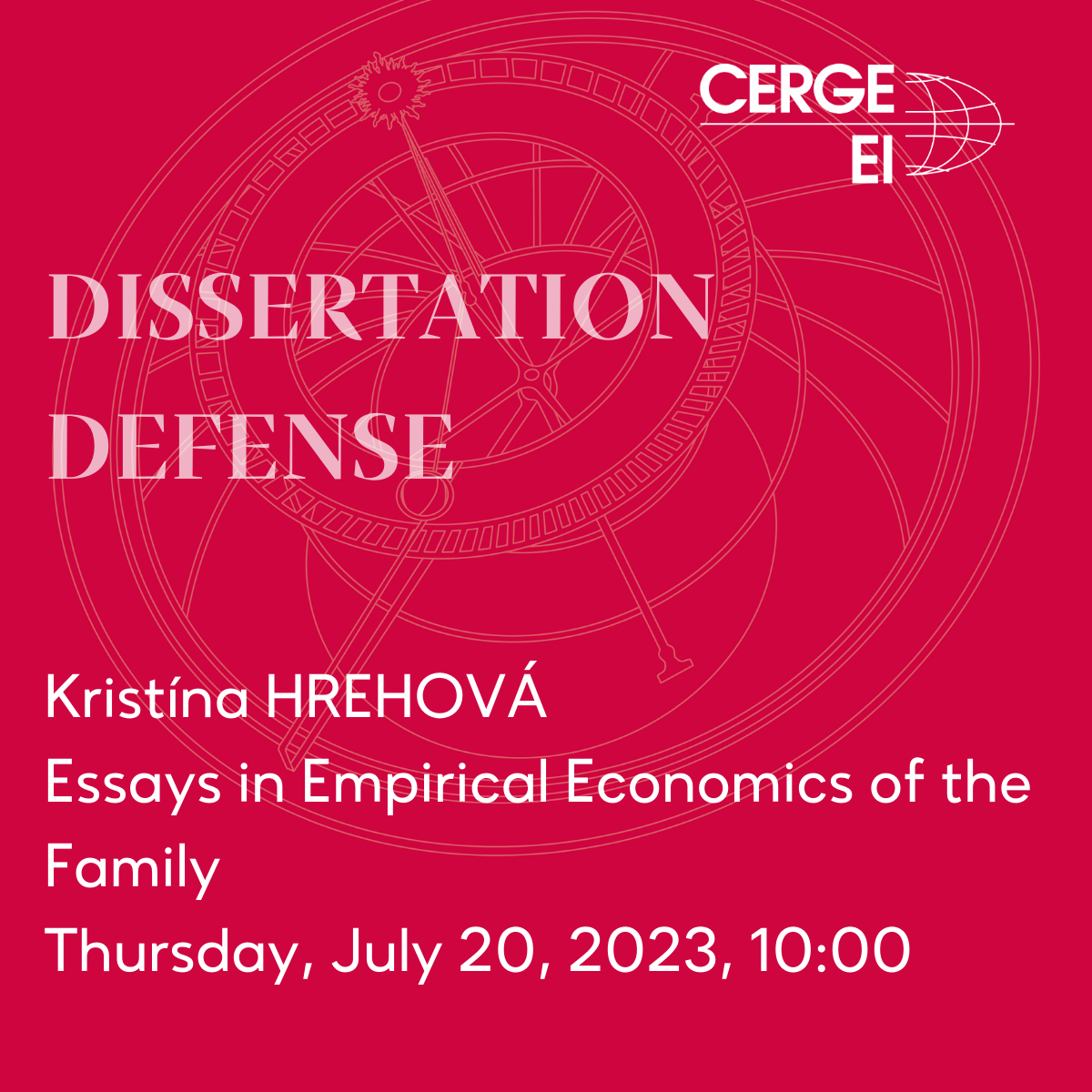Home
Thursday, 20 July, 2023
Kristína Hrehová: Essays in Empirical Economics of the Family

Dissertation Committee:
Štěpán Jurajda (CERGE-EI, Chair)
Randall Filer (The City University of New York, CERGE-EI)
Nikolas Mittag (CERGE-EI)
Mariola Pytliková (CERGE-EI)
Erika Sandow (Umeå University)
Defense Committee:
Vasily Korovkin (CERGE-EI, Chair)
Paolo Zacchia (CERGE-EI)
Radka Dudová (Czech Academy of Sciences)
Referees:
Mika Haapanen (University of Jyväskylä)
Martin Kahanec (Central European University)
On-line connection:
https://call.lifesizecloud.com/18506138
Passcode: 1581
Abstract:
This thesis studies important family decisions empirically. Families are confronted with various challenges and shocks including long commutes, insolvency and unwanted pregnancies. I study how different actors including firms, state officials and NGOs influence family outcomes when dealing with these challenges. This thesis consists of three quasi-experimental empirical studies that approximate causal impacts of shocks, including firm relocations, aid center locations and mailing campaigns, on important outcomes of family stability, personal bankruptcy rates and reproductive rates. This thesis contributes to existing empirical research by proposing novel identification strategies and using new sources of variation.
In the first chapter we study the impact of firm relocations on commuting distance and the probability of married and cohabiting couples with children separating. We use Swedish register data for 2010-2016 and select employees of relocating firms with one workplace and more than 10 employees. Focusing on this sample allows us to use plausibly-exogenous variation in the commuting distance arising from the relocation. We extend the literature on the effect of commuting on relationship stability by reducing the possibility for unobserved time-variant factors to bias our estimates. While previous literature has focused on the difference between short- and long-distance commuting, we focus on changes in the commuting distance that are externally induced by firm management. We find a small but statistically significant negative effect of increased firm relocation distance on family stability. A 10 km change in commuting distance leads to a 0.09 percentage point higher probability of separation if the commuter remains with the firm for the next 5 years.
In the second chapter, we study how access to public services can influence their take-up. Personal bankruptcy aims to provide a fresh start to debtors. While bankruptcy is often the only solution to financial distress, large spatial distances to affordable legal services may result in their underuse by eligible debtors. Using a large administrative dataset of personal bankruptcies, we study the impact of spatial distance from public Centers for Legal Aid (CLAs) on the regional incidence of personal bankruptcy in Slovakia. We avoid endogeneity by focusing on the increased availability of legal aid while controlling for the expected distance from the nearest CLA, which serves as the first contact point in the process of filing for personal bankruptcy in the Slovak Republic. Distance from these legal aid centers has a significant impact on personal bankruptcy rates: the closer the nearest CLA, the larger the prevalence of personal bankruptcy in a given municipality. We quantify the impact of service access on personal-bankruptcy rates, showing that improved access to free legal aid has both a statistically and substantively significant impact on the use of personal bankruptcy by the public. At the end of the almost 3-year-long period analyzed, municipalities with good access to CLAs had 3.3 more bankruptcies per 1,000 inhabitants than those with weak access to CLAs. This effect is significant, as the average national bankruptcy rate until December 2019 reached 6.3 bankruptcies per 1,000 persons.
In the third chapter, I study the impact of mailing campaigns on families. Both pro-choice and pro-life NGOs believe their campaigns to be effective, but there is little evidence on this question due to the rare nature of abortion and the selective nature of activist location and intensity. In this paper, I provide the first empirical assessment of the conception and abortion-rate effects of a pro-life leaflet mailing campaign. I study an extensive mailing campaign that operated in Slovakia during 2016-2017 and employed widely used pro-life frames. To identify its effects, I use a municipality-level inverse probability weighting strategy. The results suggest that the campaign did not have a statistically significant effect on conception rates or abortion rates conditional on conception.
Full Text: "Essays in Empirical Economics of the Family"








